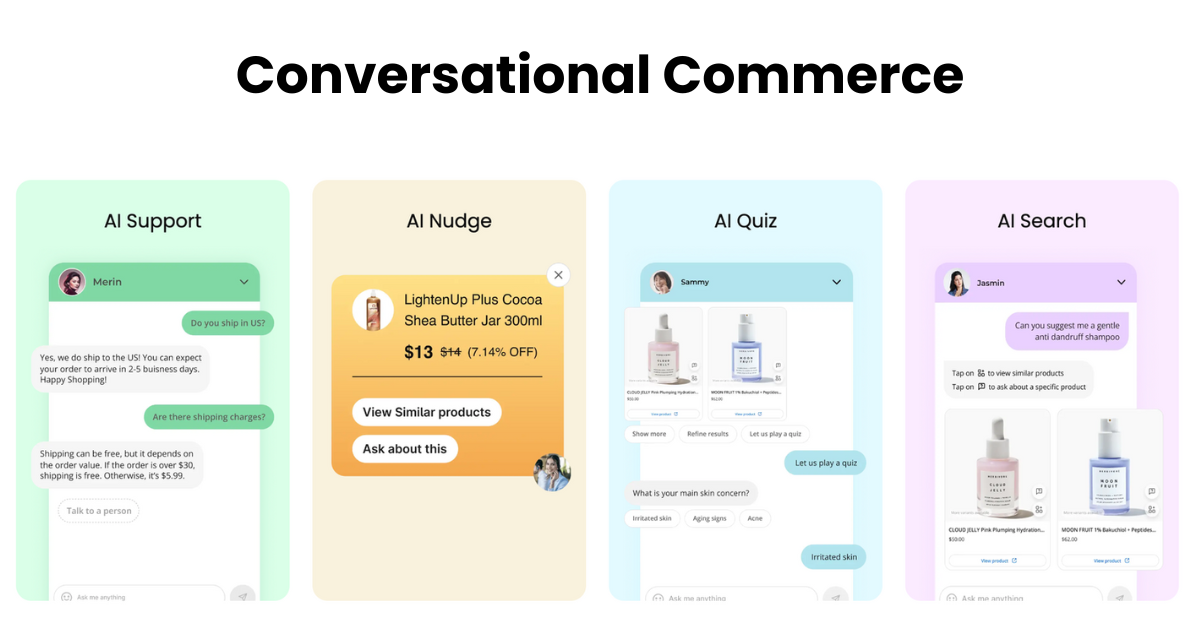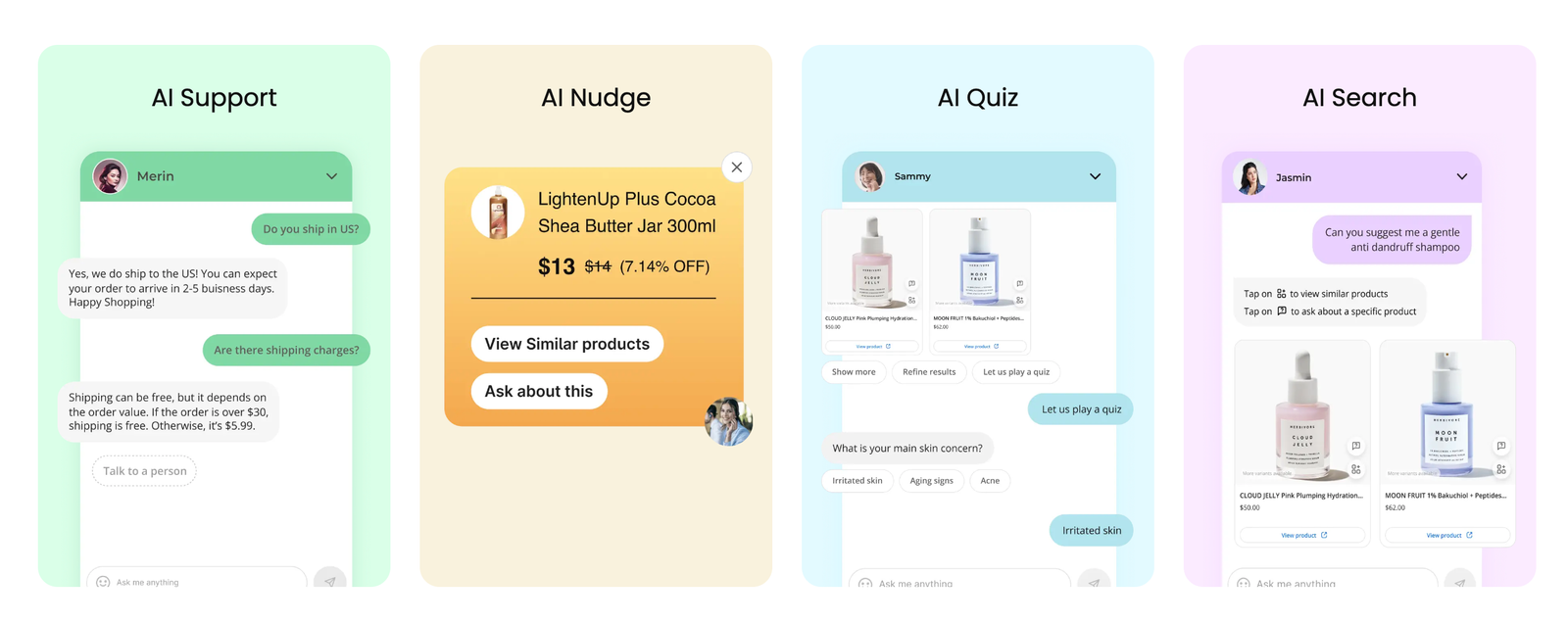Conversational Commerce: Overview, Benefits, Types, Examples

The revolution in shopping is all about having conversations! Conversational commerce offers a more convenient and interactive way to shop, revolutionizing the way we engage with brands. This blog post delves further into this fascinating topic, examining conversational commerce, its various forms, advantages for customers and organizations, and real-world applications that you may already be aware of. So fasten your seatbelts and prepare to discover how talks are quickly replacing money in business transactions!
What is Conversational Commerce?

Conversational commerce platform is the fusion of artificial intelligence, e-commerce, and messaging platforms. It allows companies to communicate with clients using chat and messaging interfaces to conduct business. Personalized assistance, product recommendations, and support are provided to clients in real time during their shopping journey using chatbots, virtual assistants, and other AI-powered solutions. The goal of conversational commerce is to make the purchasing experience more easy, convenient, and conversational by enabling users to shop, inquire, and finish transactions on websites or messaging apps in a seamless manner. It includes a broad range of tasks carried out via conversational interfaces, including as placing orders, assisting customers, finding products, and processing payments.
What Are The Benefits Of Conversational Commerce?
Conversational commerce offers a range of benefits for both businesses and consumers. Here are some of the key advantages:
Enhanced Customer Experience: Conversational commerce platform provides a more convenient and personalized shopping experience. Customers can get answers to questions, receive product recommendations, and complete purchases all within a familiar chat interface.
Increased Sales and Reduced Cart Abandonment: Conversational commerce offers real-time support and guidance during the buying journey, conversational commerce can help convert more website visitors into customers and reduce the number of abandoned carts.
Improved Customer Loyalty: The ability to interact directly with a brand in a conversational way can foster stronger relationships and build trust. Conversational commerce can lead to increased customer loyalty and repeat business.
24/7 Availability: Chatbots and messaging apps never sleep! Conversational commerce allows businesses to provide customer support around the clock, which is especially valuable for customers in different time zones.
Valuable Customer Data and Insights: Conversations with customers provide a treasure trove of data on their preferences, needs, and pain points. With Conversational commerce businesses can leverage this data to improve their products, marketing strategies, and overall customer experience.
Reduced Costs: Conversational commerce can help businesses automate tasks like answering frequently asked questions, freeing up human customer service representatives to handle more complex inquiries.
What Are The Types Of Conversational Commerce?
Conversational commerce leverages chat, messaging, or other natural language interfaces to interact with customers, facilitating buying decisions and enhancing customer service. Here's a detailed look at the types of conversational commerce:
Chatbots: Automated software programs capable of conducting conversations via textual methods. Chatbots are often used on websites, messaging apps, or social media platforms to answer common customer queries, recommend products, and guide users through the purchasing process without human intervention.
Voice Assistants: Utilize voice recognition technology to assist users through voice commands. Popular platforms include Amazon's Alexa, Google Assistant, and Apple's Siri. Voice assistants can help with product searches, complete purchases, or provide customer support, offering a hands-free shopping experience.
Live Chat: Involves real-time messaging between customers and human agents. Live chat is integrated into websites and apps, providing immediate assistance, personalized advice, and support. It combines the convenience of digital interaction with the nuanced understanding of a human representative.
Messaging Apps: Platforms like WhatsApp, Facebook Messenger, and WeChat where businesses can communicate directly with customers. Companies use these apps for personalized marketing, customer support, and transactional messages, taking advantage of the widespread use and familiarity of these platforms.
Social Media: Leveraging social networks for conversational commerce involves using posts, direct messages, and comments to engage with customers. Brands can directly sell products, offer support, and provide personalized recommendations through platforms where their customers already spend much of their time.
Augmented Reality (AR) Conversations: Emerging technology that enhances product visualization through AR, combined with conversational interfaces. Customers can use AR to see how products would look in real life while engaging in conversation for more information or to make a purchase.
5 Best Conversational Commerce Examples
Here are five examples of conversational commerce tools:
Manifest AI

Manifest AI is a GPT-powered conversational commerce platform tailored for Shopify stores, revolutionizing customer interactions and enhancing the shopping experience. Here’s how it stands out:
- Seamless Integration: Effortlessly connects with Shopify, providing a cohesive user experience without disrupting the store's existing setup.
- AI Support: Offers real-time, automated customer service, handling 95% of customer queries and resolving issues swiftly, which helps in keeping customers satisfied and engaged.
- Personalized Recommendations: Utilizes customer data to offer personalized product recommendations, enhancing the shopping journey and potentially increasing sales.
- Enhanced Search Functionality: Employs natural language processing to improve search results, making it easier for customers to find what they're looking for.
- Interactive Engagement: Features like AI nudges and quizzes engage customers more deeply, gathering insights to further personalize the experience.
Drift

Drift is a conversational commerce marketing platform that helps businesses engage with website visitors in real-time through chatbots and live chat. It uses AI to qualify leads, schedule meetings, and assist customers throughout their buying journey.
Intercom

Intercom is a conversational commerce that offers a suite of customer messaging tools, including live chat, chatbots, and targeted messaging campaigns. It enables businesses to communicate with customers across various channels, providing support, assistance, and personalized recommendations based on user behavior.
Zendesk Chat

Zendesk Chat is a live chat software that allows businesses to communicate with customers in real-time. It includes features such as chatbots, proactive messaging, and customizable chat widgets to enhance the conversational commerce experience.
ManyChat

ManyChat is a chatbot platform that specializes in Facebook Messenger marketing. It enables businesses to create interactive chatbots for automating customer interactions, sending targeted messages, and driving sales directly within Messenger.
Conclusion
The way we shop is being swiftly transformed by conversational commerce, which provides a more convenient, engaging, and personalized experience. Businesses can interact with consumers on their terms, respond to inquiries, offer assistance, and eventually increase revenue by implementing various conversation kinds including chatbots, messaging applications, and voice assistants. One thing is certain as conversational commerce develops further: communication will be the primary means of shopping in the future.

.png)
